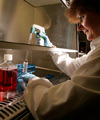October
£8M investment for the next generation of North scientists

Newcastle is leading a partnership of North universities which has been given funding by Government to train the scientists of the future.
Business Secretary Vince Cable today announced £125M of funding over five years to support the training and development of 1,250 PhD students (Friday 3rd October).
The funding will train students in world-class bioscience to lead the next industrial revolution and boost the economy by building on UK strengths in agriculture, food, industrial biotechnology, bioenergy and health. The investment has been made by the Biotechnology and Biological Sciences Research Council (BBSRC).
A partnership between Newcastle, Durham and Liverpool Universities has won £4m of that funding, which will be doubled with match funding from other sources and used to train 80 students over five years.
The funding has been awarded to leading universities and scientific institutions through Doctoral Training Partnerships that provide the best skills and training for PhD students. The strategic investment will ensure that researchers are trained in areas that will benefit the UK and will help to develop new industries, products and services.
Professor Barry Hirst of Newcastle University, Director of the BBSRC Doctoral Training Partnership between the Universities of Newcastle, Liverpool and Durham, said: “All three universities are pleased to play a key role in training students in the North of England as part of this national programme, helping to keep the region at the forefront of scientific development. Through additional funding from other sources, the Newcastle, Liverpool and Durham BBSRC Doctoral Training partnership will be doubling this investment by BBSRC to ensure 80 students are trained in the partnership as part of this exciting national programme.”
Business Secretary Vince Cable said: “The UK punches far beyond its weight in science and innovation globally, which is a credit to our talented scientists and first-class universities.
“This new funding will safeguard Britain’s status as a world leader in life sciences and agricultural technology.”
Our future depends on a new generation of scientists trained to help tackle major challenges, such as the growing demand for food; the need to transform to more economically and environmentally sustainable industries and energy – developed from plants, bacteria, algae and fungi – to reduce dependency on fossil fuels; and maintaining health throughout life, reducing pressure on the healthcare system. Investing in bioscience research now, and supporting capabilities and skills, will enable to the UK to reap huge social and economic benefits in the future.
Excellent and highly skilled researchers are vital to achieving this, fuelling new discoveries. By investing in the skills base, BBSRC not only supports research but also helps to secure the nation's future, driving inward investment, creating new jobs and maintaining the UK's position as a global leader.
Dr Celia Caulcott, BBSRC Executive Director, Innovation and Skills: “Bioscience is having a massive impact on many aspects of our lives. BBSRC is paving the way for an explosion in new economic sectors and bioscience that will change the way we live our lives in the 21st century. To achieve this we need to maintain our leading position in global bioscience by ensuring that the next generation of scientists have the best training and skills.”
Of the 1,250 students, 30% of students will be trained in agriculture and food security, 20% in industrial biotechnology and bioenergy, 10% in bioscience for health, and the remaining 40% in other world-class frontier bioscience to help fuel future discoveries.
“The next generation of bioscientists are our future and we must invest in them now,” added Dr Caulcott.
Former BBSRC-funded PhD students are making huge impacts in these areas, such as: developing early warning sensors that alert farmers to diseased crops, reducing the use of antibiotics in the food chain, developing new coatings for medical devices to repel infection-causing bacteria, finding ways to use biological components in industry by protecting them from harsh environments in manufacturing, creating ways to study neurodegenerative diseases in the lab, developing drugs that can target the placenta in pregnancy, and helping to make new fuel sources from bacteria to reduce our reliance on fossil fuels.
published on: 3 October 2014
